Necessary Coaching Baseball to Win Tips
Coaching baseball to win is more than what is on the scoreboard. Coaches win when they are the role model that players need in their baseball development and teams win when they come away with life lessons that will serve them way beyond the playing fields. There is an ever-present debate that there is too much emphasis put on winning in youth sports, and often with good reason. Many youth coaches maintain a win at all cost attitude that is detrimental to players, and parents, "having fun" in a sport. The win at all cost coaches put kids at risk of physical and emotional damage and suck the fun out of the games for both youth and their parents. The above is not meant to say that coaching baseball to win is wrong. I believe that even at the tee ball baseball level, it is OK to play to win because players can then learn how to deal with winning and losing. Coping with adversity is one of the most important things that sports can provide maturing youngsters. It bears repeating that it is the "win at all cost philosophy" that is detrimental to sports, but that coaching baseball to win is a reasonable and necessary aspect of the competition. The very nature of sports involves a winner and loser and kids understand this, too. It becomes a problem when kids get the impression that they must win to have their coaches' acceptance or to feel like they must win to be considered a success. Coaching baseball to win at allcost coaches alienate players, parents, and opponents, and are not what youth sports should be.
Signs of Coaching Baseball to Win at All Cost
 Coaching baseball to win takes respect
Coaching baseball to win takes respect
Coaches who:
- Insist that players play injured or rush back too fast after injury. The worst of these type coaches ridicule kids with being "soft" or use the gender suggestion "Your playing like a bunch of girls" to denigrate them. Parents should ask their kids to inform them if they ever hear such words from a coach.
- Try to continually motivate their team by preaching an "us against them philosophy." They make it personal with the other side and push kids to think the opposition has disrespected them in some way.
- Never allow kids to play positions they like the best and only pitch the same pitchers, even when they are tired. Learning to play different positions is valuable at a young age even if it means possibly losing a game, or two, because of not playing kids in their best spots.
- Have a "my way or the highway" approach, allowing no input from others. The best coaches take suggestions from others and foster democracy among players and parents. The top coaches consider other's opinions before making decisions that serve the kids the best.
- Do not substitute players even when winning by a significant amount and continue to run up the score. Running up the score is never a good thing and gives teams and organizations a lousy reputation. Out of line scores is a great time to give players opportunities to play various positions.
- Ridicule or ignore struggling players. This action is one of the most abhorrent coaching behaviors as it destroys a kid's self-confidence and desire to keep playing. Likewise, benching youth ballplayers over performance issues should never be an option.
- "Goes off" on the team when they lose and threatens them with physical exercise as punishment for failing. Like the above instance, coaches should never "show the team up" by castigating them at any time and lose the perspective it is only youth sports and games.
- Encourages underperforming players to look for another team to move to during the season. It is one thing to give honest evaluations of athletes and help them find the best level for their skills, but another to encourage them to find another team kick.
- Practicing year-round with the thinking that more is better. Treating youth sports like they are professional ones is a sign of the win at all cost baseball coaching to win.
The most significant indicator of incompetent coaching is when it is obvious the team is not having fun. Additionally, coaches who think the games are about them and relive their playing days through the players should get out of coaching. Further signs that the coaching situation is toxic is when kids cannot be themselves around the coach because they fear them. As mentioned, parents should act when any of these situations are taking away the fun of playing for kids. The thing coaches should understand is that coaching baseball to wincan come without the win by-any-means-necessary approach. Good coaches know how to play to win with class, where all have fun. The current inadequate coaching situation is everywhere and problematic because little or no coaching training and coaching certification exist in youth sports. Parents should insist on coaching training by their organization before each season.
Coaching Baseball to Win the Life Game
The following coaches serving kids the best and are the ones that should remain coaching for as long as possible. Coaching baseball to win involves coaches who:
- Give kids equal playing time over the course of the season. This equality should apply for all levels of youth baseball with the only exception being for kids that miss too many practices for less than good reasons. Rules for that situation should be set at the start of the season.
- Never tries to convincean injured player to play. Carrying enough players from the beginning is crucial, so the team doesn't come up short of players as the season progresses.
- Do not try to create an adversarial relationship with other teams as motivation and show respect for the other side. When the opposing coach is the win at all cost coach, coaches must do their best not to lower their team's standards in retaliation.
- Let's kids play and learn different positions, change batting order when opportunities arise and never sits a player over a poor performance. Of course, good coaches may use the bench to help un-confident and frustrated players from time to time, so they are not put into positions that are embarrassing to the player.
- Consider the input of players, other coaches, and parents before making decisions. When others feel like they have a say, they will work harder and believe in the coach more.
- Make all players feel like an integral part of the team whether they are contributing much or not.
- Do not run up the score or embarrass the opposition in any way.
- Never ignores players, continually tries to help them when they struggle and never take away their self-worth. The best coaches do not let players feel entitled, become overconfident and brag about their success.
- Recognize the difference between effort and results and physical and mental errors. Praise effort, accept the consequences, teach the physical and mental skills that bring improvement.
- Encourage kids to be themselves, avoid cliques and promote social activity and fun among players.
- Keep players focused with a "win as a team, lose as a team" philosophy. Little serves kids down the line in their lives than the development of a team attitude and teamwork.
- Leave the game behind when it is over, never threatening the team when they don't play well with physical punishment.
- Teach respect for the game and others, including their parents, whom many kids treat as their servants,
- Explain and hold kids what accountability and responsibility are.
- Help kids learn to deal with winning and losing, personal success and failure.
- Communicate with parents on a continual basis and nip any second guessing and controversy in the bud before it affects the players.
- Never swear or use the gender distinction.
- Explain the danger of social media.
- Speak to kids one on one on occasion, too. Find out their confidence level so you can put them in positions to succeed as often as possible.
- Thank kids for their attention and their effort. Make it clear how proud you are to have the opportunity of coaching them and that you will always believe in them.
Of course, the philosophy of the age of kids, league, and level of competition comes into play. There is a big difference between travel and recreational levels and amateur and professional levels. A win at all cost philosophy has no place in youth sports. Simply put, coaches, who set an equal emphasis on player development and fun, avoid the trap of playing to win at any cost and are coaching baseball to win, but with respect for all.
 Coaching baseball to win the life game - get now
Coaching baseball to win the life game - get now
#coachingbaseball #baseballcoachingtips #jackperconte
See Also: Top 10 Keys to Giving Baseball Lessons


 Coaching baseball to win takes respect
Coaching baseball to win takes respect Coaching baseball to win the life game - get now
Coaching baseball to win the life game - get now
chandler allen says:
"Hi my name is chandler, i’ve enjoyed..."
On Wanting to tryout for summer ball. as an 18 year old
david graham says:
"With no current MLB team in Canada,..."
On With no current MLB team in
Charles Chavez says:
"To All Coaches: Do you have13U or..."
On Looking for Games